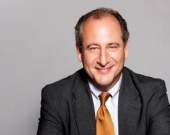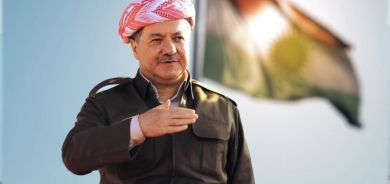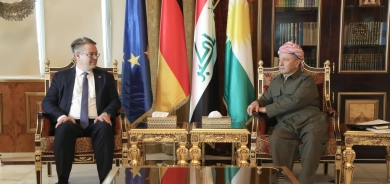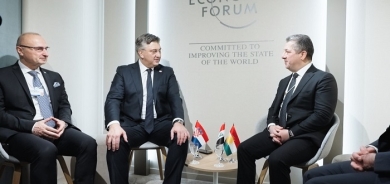PEACE AND PROSPERITY MORE LIKELY AFTER THE WITHDRAWAL OF US TROOPS

The end of the year is also the end of the US troop presence in Iraq. Some people predict that the US troop withdrawal will open the flood gates to renewed Kurdish-Baghdad fighting, specifically over the trigger line that divides their forces. The two sides already have come close to fighting on several subsequent occasions, usually outside of the urban areas where military commanders are more prone to act on their own. In 2009, for example, Baghdad troops entered the disputed but mainly Kurdish town of Altun Kupri. When the residents supported by the peshmerga began to demonstrate, the Baghdad troops were told to shoot to kill. Only the presence of U.S. troops stationed nearby prevented bloodshed. Since late January 2010, the United States has been trying to build trust between the two sides by using them along with embedded U.S. troops in joint patrols (called combined security mechanisms or csms) and manning 26 checkpoints together. In a few places they even slept and ate together.
Barham Salih, the KRG prime minister, called these sorts of measures “Band-Aids to build confidence and generate stability.” However, what will happen now that the U.S. troops are withdrawn? Salih has confided that “I think as the Americans are leaving I am very, very concerned.” Others have expressed themselves more strongly. For example, General Turhan Yousef Abdal Rahman, the deputy police chief in Kirkuk, declared that the “the American withdrawal is a deadly mistake. . . . American troops should stay, or there will be civil war.” A Kurdish police commander agreed: “I’m totally confident that the city of Kirkuk will have a civil war within 24 hours after U.S. troops leave. I guarantee it.” On the other hand, the U.S. troop withdrawal just might convince Baghdad and Irbil to reach an agreement on their internal division of powers including their internal borderline.
Others predict the imminent collapse of Nouri al-Maliki’s weak coalition government. For example, the arrest warrant for Iraq’s Sunni Arab Vice President Tareq al-Hashemi on charges of terrorism has already plunged Iraq into a political crisis. In addition, the riots in Zakho early in December illustrated troubles within Kurdistan too. Now that the US troops are gone, Turkish and Iranian attacks against the PKK and PJAK in Kurdistan that have led to the deaths of a number of Kurdish civilians may escalate. The Kurds could lose everything they have achieved since 1991 and especially since the fall of Saddam Hussein in 2003.
Although such a disaster cannot be ruled out, it seems more likely that the two sides will be able to muddle through with a minimum of violence for the following reasons. 1.) Nobody wants to return to the horrific state terrorism of Saddam Hussein’s time. Despite Arab impatience with the Kurdish gains and continuing demands, there is still a general consensus to accept the Kurdish federal state. The former US ambassador to Iraq, Zalmay Khalilzad, made this point when I spoke with him at a conference in Washington in March 2010.
In addition, 2.) the dependent relationship between the Irbil and Baghdad militaries represents an important factor that might prevent the two from falling into actual conflict. US Lt. Colonel Dennis P. Chapman recently wrote about this encouraging situation. Chapman noted, for example, that “Peshmerga troops have been converted into Iraqi Civil Defense Corps (ICDC) units, Iraqi National Guard and Iraqi Army units, Environmental and Forest police, Department of Border Enforcement units, and Police. . . . Probably the biggest Peshmerga transformation initiative has been the transfer of large numbers of Kurdish troops from Peshmerga formations into the Iraqi Army.” Baghdad even “has accepted in principle the responsibility for funding the Peshmerga, as memorialized in the Iraqi budget framework laws for 2007 and 2008.” However, the two sides have not yet agreed on any funding formula. Not to be deterred, Irbil has also asked Baghdad to pay pensions for some 90,000 peshmerga retirees.
Although “there is a fair amount of suspicion among non-Kurds of Kurdish intentions . . . it appears that Kurdish units in the Iraqi army have demonstrated greater loyalty to Iraq by their actions than many of their Arab counterparts.” Indeed, Chapman concluded that “an open breach between the Kurdistan Region and the federal authorities. . . need never occur, given even a modicum of flexibility and restraint on both sides.” Indeed, “the central Government and the [Kurdish] Region have shown a remarkable ability to defuse (or at least sidestep) potentially explosive issues and to cooperate on many important matters.”
Another encouraging event was KRG Prime Minster Barham Salih’s visit to Washington, DC in November 2011. His schedule was packed full of meetings with government officials such as US Vice President Joseph Biden, think tanks, civic and potential business friends, academics, and several media interviews. With US Vice President Biden, Prime Minister Salih discussed ways the United States and the KRG could ensure stability and growth in Kurdistan and Iraq as a whole after the withdrawal of the US troops. Barham Salih stressed the importance of expanding diplomatic and economic cooperation between the United States and the KRG, and highlighted the need for greater US private sector investment in Kurdistan “to create an enduring strategic relationship between the US and Iraq, including the Kurdistan Region.” For his part, Biden confirmed the US commitment to a stable, federal, and democratic Iraq. Biden also spoke hopefully about furthering the US-Iraqi relationship as outlined in the Strategic Framework Agreement of 2008. He also congratulated the Kurdish people of Iraq for their energy and spirit and praised the close friendship between the American and Kurdish peoples.
Following his meeting with Biden, Barham Salih also met with Deputy Secretary of State William J. Burns, again accompanied by Iraqi ambassador to the US, Dr. Ali Sindi. Then Salih met with a number of high-ranking members of the US Senate, including John McCain, Lindsey Graham, and Joseph Liberman. Salih also met with several members of the US Congressional Kurdish-American Caucus. The next day Barham Salih met with Robert Zoellick, the President of the World Bank where he emphasized that the US troop withdrawal did not mean an end to the US engagement with Kurdistan. The KRG prime minister also met with over 200 members of the US business community where he outlined his vision of positive Kurdish developments.
Although it is impossible to predict the future, it seems more likely that Kurdistan will continue to develop and prosper despite the US troop withdrawal.

 Michael Gunter
Michael Gunter











